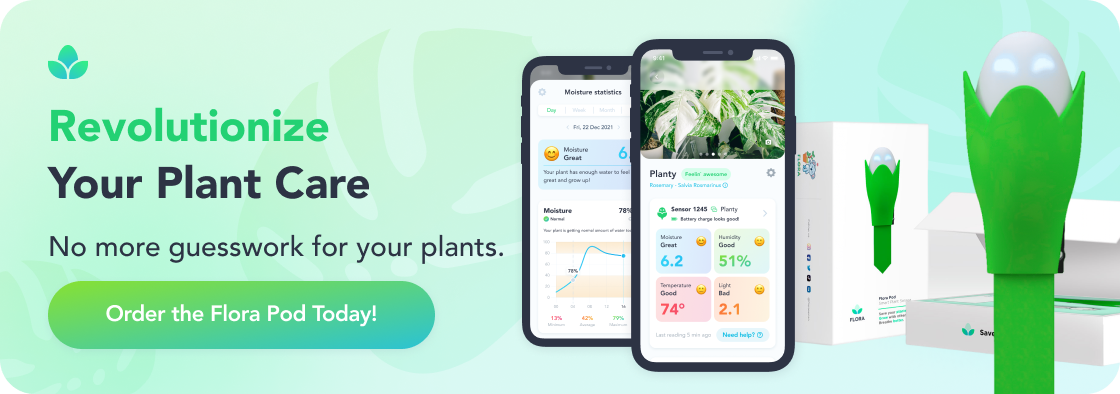How Often to Water Fiddle Leaf Fig & Other Watering Guidelines

Fiddle leaf figs, with their large, glossy leaves, add a tropical flair to any space. Originating from Africa's tropical regions, they flourish in warm temperatures and high humidity. However, mastering the art of watering these plants can be tricky. This guide provides you with a comprehensive approach to watering your fiddle leaf fig, ensuring its health and vitality.
Understanding Watering Needs
Frequency of Watering
Generally, fiddle leaf figs should be watered once a week. Check the soil before each watering to prevent over or underwatering. The key is consistency; setting a regular schedule helps your plant adjust and thrive. Use a moisture meter or a more advanced monitor, like the Flora Pod, for more accurate watering.

Checking Soil Moisture
These plants prefer a delicate balance in soil moisture – not too wet, not too dry. The 'finger test' is a simple yet effective method to check this. Insert your finger about an inch into the soil; if it feels wet, hold off on watering. If it feels cool or almost dry, it’s time to water.
Be mindful of soil shrinkage, a common issue where the soil pulls away from the pot's sides, often caused by infrequent watering. This can prevent water from reaching the plant's roots effectively.
Light and Watering
Light exposure plays a critical role in your fiddle leaf fig’s watering needs. These plants do best in bright, indirect sunlight.

If your plant is in a dim area, the soil will retain moisture for longer, which increases the risk of root rot. Conversely, in a well-lit area, the soil will dry out more quickly, necessitating more frequent watering. If you’re having trouble understanding if you are getting the right lighting and water, try using the Flora app.
Humidity and Temperature Considerations
Being native to tropical climates, fiddle leaf figs love humidity. In dry indoor environments, using a humidifier or a pebble tray can help maintain the humidity levels these plants crave.
Temperature also influences water needs. During warmer months, your plant may require more frequent watering compared to the cooler, dormant winter months.
Seasonal Watering
It’s crucial to adjust your watering routine with the changing seasons. During the active growing season in spring and summer, fiddle leaf figs will likely require more frequent watering.
However, in the winter months, when the plant enters a dormant phase, reduce the frequency of watering to prevent over-saturation of the soil.
Drainage and Pot Size
Proper drainage is critical to avoid waterlogging, which can lead to root rot. Ensure your pot has sufficient drainage holes and use a well-draining soil mix.
The pot size should be proportionate to the size of your plant. A pot that's too large will hold excessive moisture, while a too-small pot can restrict root growth and dry out too quickly.
How to Water Properly
Water your fiddle leaf fig once every 7-14 days, or when the top inch of soil is dry.
Use lukewarm water: Extreme temperatures can shock the plant's roots.
Avoid using tap water: tap water might contain chemicals like chlorine and fluoride that may be harmful to the plant. Instead, opt for filtered, distilled, or rainwater.
Avoid wetting the leaves: This can lead to fungal diseases.
Drain excess water out of the pot: To prevent the roots from sitting in water.
Dealing with Overwatering and Underwatering
Overwatering: Common signs include wet, soggy soil, brown leaves, and root rot. To fix this, water less frequently and ensure the soil drains well.
Underwatering: Symptoms include drooping leaves, smaller new leaves, and brown, crumpled leaf edges. Increase watering frequency and ensure the soil stays moist.
Watering your fiddle leaf fig doesn't have to be complicated. By understanding its needs and responding to its cues, you can maintain a healthy, thriving plant. Remember, each fiddle leaf fig is unique, so observe and adjust your watering routine to suit its specific requirements.
Fern's Leafy Learnings
Water your fiddle leaf fig once a week, adjusting as needed based on soil moisture and environmental factors.
Ensure proper drainage and use well-draining soil to prevent root rot.
Adjust watering frequency with changes in light, humidity, temperature, and season.
Look for signs of overwatering (soggy soil, brown leaves) and underwatering (drooping leaves, dry soil) to adjust your watering routine.
Use room temperature water, preferably filtered or distilled, to avoid chemical buildup that can harm the plant.
Embark on a flourishing journey with plants that aren’t just decor, but companions.
At Flora, we not only bring you a vibrant selection of locally sourced, rare, and delightful plants, but we also serve as your continuous guide in your plant parenting voyage, ensuring every leaf in your sanctuary thrives. With our Flora Pod™ technology and a nurturing community of over 250,000 plant lovers, we cultivate a space where every plant parent - novice or expert - can blossom.
We propagate with a commitment to sustainability, connection, and ceaseless growth, fostering a community where each member, and their plants, are cherished and nurtured.
Crave a lush, thriving green space? Adopt a plant from Flora today!
Flora Pod™ is featured on Shark Tank!

5 Signs Your Houseplant Needs Repotting Now
Mar 02, 2026
6 Anthurium Benefits You Didn't Know About
Mar 02, 2026

How to Prune Your Houseplants Before Spring Growth Season
Mar 02, 2026

10 Best Houseplants for Spring Repotting Success
Mar 02, 2026

Can ZZ Plants Survive in Low Light Conditions?
Mar 02, 2026

5 Critical Pre-Spring Pruning Tips for Houseplants
Mar 02, 2026

Can Succulents Survive Winter Outdoors in Your Climate Zone?
Mar 02, 2026

Which Houseplants Are Toxic to Cats and Should You Avoid Them?
Mar 02, 2026





